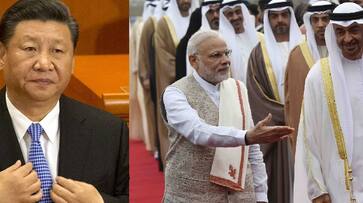While India trails China in developing better relations with the neighbours in south-east Asia, a situation that has improved remarkably under the Modi regime, Beijing would not let New delhi have a free run in the Middle East either
The United Arab Emirates today said it agreed to set up a "comprehensive strategic partnership" with China as President Xi Jinping wrapped up a three-day visit to the Gulf country.
"The UAE and China have agreed to enhance cooperation in all fields to higher levels and forge overall strategic partnerships," the official WAM news agency said.
It said this would "contribute to cementing and intensifying cooperation, boost joint development and prosperity, which is consistent with the common interest of both countries and their peoples".
China and the UAE had already signed on 20 July a raft of economic agreements and, in the run-up to Xi's visit, they agreed on oil and trade deals.
As recently as on 26 January this year, Prime Minister Narendra Modi had highlighted the strategic significance of India-UAE relations for both countries while hosting Abu Dhabi’s crown prince Mohamed bin Zayed Al Nahyan as a special guest for the Republic Day celebrations.
The very next month, Prime Minister Narendra Modi had held wide-ranging talks with the Crown Prince, as the two sides signed five agreements including a historic pact awarding a consortium of Indian oil companies a 10% stake in offshore oil concession.
And earlier this month, India and the UAE decided to hold a Joint Commission meeting in Abu Dhabi while agreeing to cooperate in select countries in Africa. The UAE also sought India’s support in exerting international pressure to sort out the Yemen issue in line with the UN resolution.
This means that, while India trails China in developing better relations with the neighbours in south-east Asia, a situation that has improved remarkably under the Modi regime, Beijing would not let New Delhi have a free run in the Middle East either.
According to an American geopolitical theory, China casts a "string of pearls" in the Indian Ocean region. Beijing has developed a network of military and commercial facilities and relationships along its maritime lines of communication. These facilities extend from mainland China to Port Sudan. There are major maritime choke points such as the Strait of Mandeb, the Strait of Malacca, the Strait of Hormuz, and the Lombok Strait as well as other strategic maritime centres in Pakistan, Sri Lanka, Bangladesh, the Maldives, and Somalia along the way of this 'string'.
The Jebel Ali port of the UAE is strategically significant, too. People of Indian origin working in private sector companies based in Dubai have got into legal problems in that country when they were suspected of being spies at a time when the UAE port did not allow the docking of Indian ships.
With inputs from agencies
Last Updated Jul 21, 2018, 3:41 PM IST










![Salman Khan sets stage on fire for Anant Ambani, Radhika Merchant pre-wedding festivities [WATCH] ATG](https://static-ai.asianetnews.com/images/01hr1hh8y86gvb4kbqgnyhc0w0/whatsapp-image-2024-03-03-at-12-24-37-pm_100x60xt.jpg)
![Pregnant Deepika Padukone dances with Ranveer Singh at Anant Ambani, Radhika Merchant pre-wedding bash [WATCH] ATG](https://static-ai.asianetnews.com/images/01hr1ffyd3nzqzgm6ba0k87vr8/whatsapp-image-2024-03-03-at-11-45-35-am_100x60xt.jpg)


